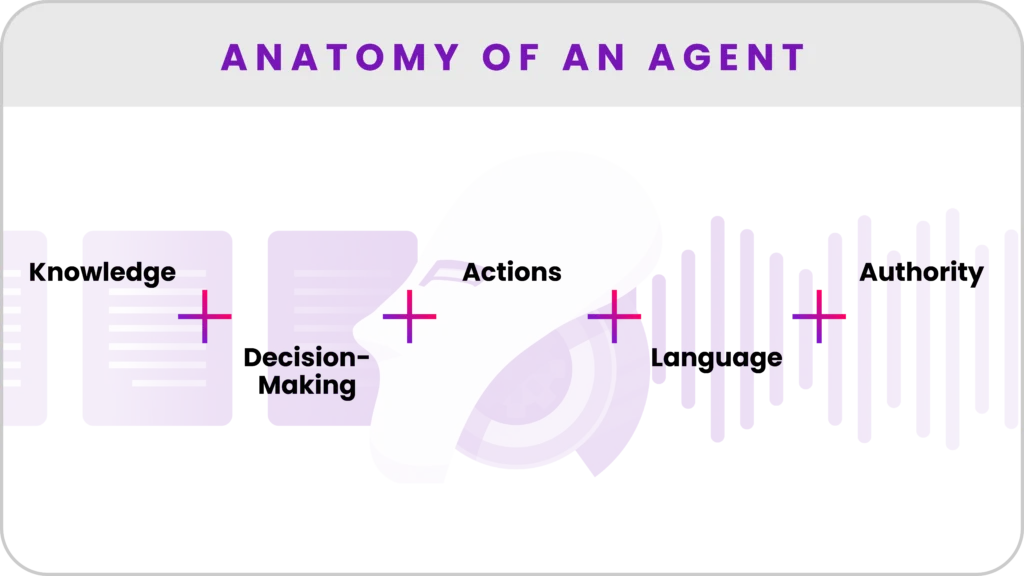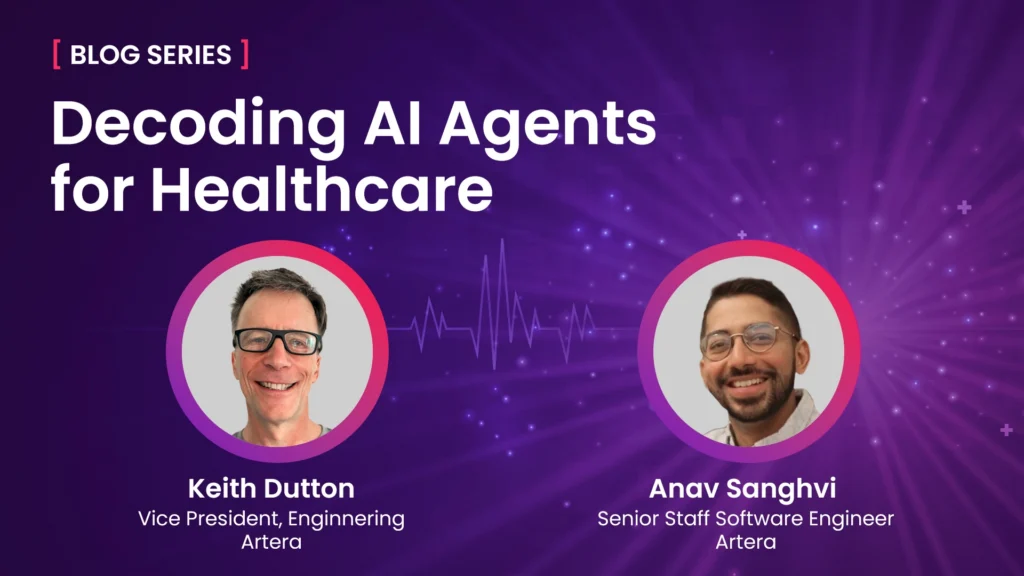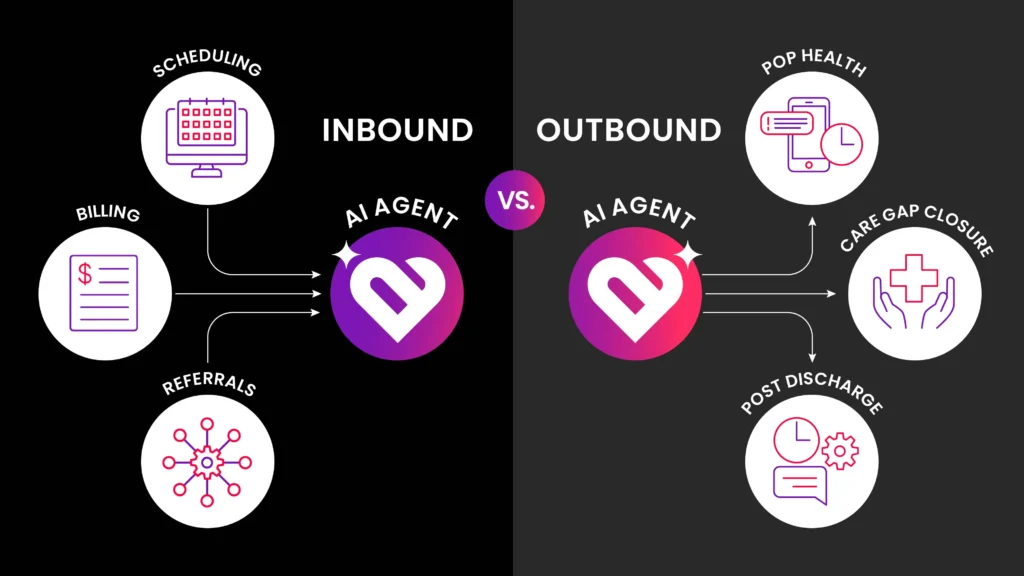We all know that artificial intelligence (AI) is everywhere, in every industry and in (nearly) every aspect of our lives. One of the most exciting developments in this field is the use of AI agents, which are emerging as indispensable tools for healthcare organizations aiming to enhance operations, provide superior patient care and streamline administrative tasks.
This blog will help you understand what AI agents in healthcare are, their impact within health systems and how organizations like Artera are shaping the future of agentic AI within patient engagement. Let’s first start with the basics:
What Are AI Agents in Healthcare?
“AI agent” refers to a system that is capable of autonomously or independently performing tasks on behalf of a user or another system by designing its workflow and utilizing available tools. Far from basic chatbots, today’s AI agents are dynamic, engaging and capable of handling multi-faceted tasks across various healthcare functions. We believe there are broadly three types of AI agents within healthcare, which we will break down further in the blog:
- Administrative and Operational
- Ambience Voice / AI Medical Note-Taking
- Clinical Decision Support
Leveraging advanced technologies such as natural language processing (NLP), machine learning and integration with Electronic Health Records (EHRs), these AI-powered agents assist in patient interactions, workflow automation and operational efficiency. Given the many benefits of the technology, it’s safe to say that AI agents are where healthcare is headed, especially in terms of patient communication.
Key Characteristics of Healthcare AI Agents:
- Autonomous Decision-Making: Analyze vast amounts of data to make evidence-based decisions.
- Multi-Language Support: Interact with diverse patient populations in their preferred language.
- Contextual Understanding: Engage in complex, natural conversations based on context.
- End-to-End Capabilities: From scheduling appointments to managing billing queries, AI agents offer comprehensive support.
With the potential to optimize processes and create personalized patient experiences, AI agents enable healthcare systems to shift from reactive to proactive care while alleviating administrative burdens and reducing staff workload.
How Providers Are Using AI Agents in Healthcare
AI agents unlock potential across a wide array of healthcare functions, including patient communication, operations, and care delivery. As we mentioned before, there are three types of AI agents in healthcare:
- Administrative and Operational: streamline administrative tasks (scheduling and billing) and also serve as virtual assistants, guiding patients through appointment scheduling and engagement
- Ambience voice / AI medical note-taking: automate and enhance clinical documentation by converting patient-clinician conversation into structured clinical notes in real-time
- Clinical Decision Support: Enhance clinical decisions via predictive analysis, personalized treatment plan, info retrieval, remote monitoring and more
To break this down even further, let’s outline a few ways AI agents in healthcare are making an impact:
1. Customer Service and Patient Engagement
AI agents are transforming patient communication by creating seamless, real-time interactions.
- Scheduling and Rescheduling: Automatically coordinate appointments based on patient preferences and provider availability.
- Billing Assistance: Resolve payment queries and generate invoices efficiently.
- Guided Navigation: Help patients with secure password resets or connecting with referrals.
AI examples like Artera’s AI agents deliver these services, engaging patients in clear, empathetic and efficient conversations.
2. Administrative Workflows
AI agents lighten the burden of repetitive administrative tasks, freeing up valuable staff time.
- Automation of Routine Processes: Tasks such as appointment reminders, intake forms and insurance pre-authorizations are handled effortlessly.
- Resource Allocation: Optimize scheduling staff to place human effort where it matters most.
This combination of efficiency and accuracy ensures smoother operations across healthcare systems.
3. Clinical Support
AI agents assist providers by analyzing medical histories, imaging or genetic profiles to offer real-time insights.
- Data Analysis: Aid in early disease detection and personalized treatment recommendations.
- Enhanced Precision Medicine: Leverage patient data for tailored treatments and predictive analytics.
AI’s ability to support decision-making empowers providers to deliver informed, compassionate care.
4. Patient Monitoring and Predictive Care
AI-driven technologies enable continuous patient monitoring and early detection of potential health issues.
- Smart wearables and IoT devices collect real-time health data, alerting providers to changes in patient conditions.
- Predictive algorithms identify at-risk patients, allowing for timely intervention and improved outcomes.
This proactive approach reduces hospital readmissions and enhances overall patient safety.
Benefits of AI Agents for Healthcare
Implementing AI agents offers significant advantages to healthcare organizations looking to improve efficiency and focus on patient-centered care.
1. Streamlined Operations: By automating repetitive tasks, AI agents reduce administrative burdens and shorten workflows, allowing staff to focus on high-impact work.
2. Faster, Data-Driven Decisions: AI’s ability to process vast data sets in real-time helps healthcare providers make more accurate diagnoses and informed decisions.
3. Improved Patient Satisfaction: Engaging AI agents enhance the patient experience by providing faster responses, clearer communication and on-demand assistance.
4. Cost Savings: AI reduces costs by boosting efficiency and optimizing resource allocation, creating opportunities for healthcare systems to do more with less.
The Future of AI Agents with Artera
Artera is transforming how providers integrate AI agents into their operations. Trusted by over 900 healthcare organizations and federal agencies, Artera’s agent-driven solutions are built specifically for healthcare’s unique challenges.
Artera’s AI Agent Offerings
Artera’s AI Agents (voice and text) leverage the leading large language, text-to-speech, speech-to-text and generative voice models to engage patients in a dynamic and completely realistic manner.
We enrich agents with healthcare tuning from our over 2B annual patient engagements, including our validated workflow library, and your proprietary content.
Our AI Agents are purpose-built with multi-language in mind to support a diverse population. The multi-modality (images, videos, etc.) of our agents allows the patients to interact beyond just voice and text, making the experience more humanlike.
Artera empowers providers to scale AI at their own pace. Their three-tier approach ensures flexibility based on specific organizational needs:
- AI Co-Pilots for Staff: Support staff with message shortening, conversation summaries, and real-time language translation, enabling faster and more accurate responses to patient inquiries.
- Flows Agents for Efficiency: Semi-autonomous agents streamline workflows, handling routine tasks while allowing staff to maintain decision-making control.
- Fully Autonomous AI Agents : Acting as a digital workforce, these agents handle complex tasks and operational management, enabling staff to dedicate more time to patient care.
Artera is the “Easy Button” for AI Agents: Artera’s technology makes it seamless to convert your existing deterministic workflows (customer-specific or from our library) into autonomous text & voice agents.
Adrianna Hosford, Chief Communications Officer at Artera, emphasizes the flexibility of their approach, stating, “Our virtual agents are tailored to meet the unique needs of healthcare organizations, prioritizing their comfort level and specific operational goals.”
Why Artera Stands Out
Not all AI agents in healthcare are created equal. Unlike generic AI platforms, Artera leverages over a decade of healthcare expertise and real-world patient engagement data to fine-tune its agents. Features include:
- Validated Workflow Library from 2 billion annual patient touchpoints.
- Seamless Integration with EHRs and existing tools.
- Security First approach, ensuring HIPAA compliance and trusted data handling (no PHI/PII used for training models).
Partner with Artera for Your AI Journey
Artera’s adaptive, scalable solutions are transforming patient engagement and operational efficiency in healthcare. Whether you’re exploring virtual agents for the first time or ready for full-scale deployment, Artera tailors its services to fit your organization’s needs.
We recognize that AI agents are not just the future of patient engagement; they are shaping its present. From automating repetitive processes to delivering personalized patient care, these intelligent agents are revolutionizing the industry.
Don’t get left behind. Book a demo with Artera to learn more about how Artera’s AI solutions can transform your organization.
Ashu Agte, Artera’s Chief Technology Officer, summarizes it best, “This is just the beginning. As technology grows, we will lead the charge in advancing AI for enhanced patient outcomes and operational success.”



